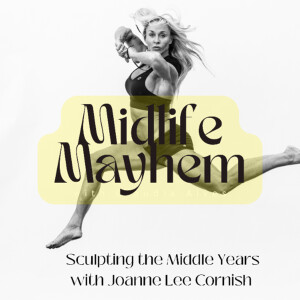
Friday May 02, 2025
PROTEIN & BODY FAT
🎉 ONE WEEK LEFT! Registration closes in just 7 days for the 2025 21-Day Signature Weight Loss Program — and this year, it's better than ever. New topics, an entire content library (don’t ask me how long that took 😅), and a deeper focus on sustaining results — because the real fear isn’t losing weight… it’s wondering if it’s all going to come back.
👉 www.21daysignature.com — join us before the doors close!
🎙️ Midlife Mayhem Podcast – NEW EPISODE OUT NOW!
💥 "Will Too Much Protein Make You Fat? NOPE. Here’s Why."
Click to listen on your favorite platform: MIDLIFE MAYHEM
🎙️ Midlife Mayhem Podcast – NEW EPISODE
🔬 “Will Too Much Protein Make You Fat? The Science Says No (and Here’s Why)”
🎧 Listen on your favorite platform → www.joanneleecornish.podbean.com
This episode is a deep dive into one of the most persistent myths in fat loss: “If I eat too much protein, won’t it just turn into fat?” Short answer: No. Long answer? Buckle up.
🧱 The Brick Fire Analogy (and Why It Matters)
Protein is not like carbs or fat. It’s not a fuel.
-
Carbs = Paper: Quick-burning energy.
-
Fat = Wood: Slower-burning, steady energy.
-
Protein = Bricks: You don’t light bricks on fire. You build with them.
🧪 Why Lean Protein Doesn’t Become Body Fat
Let’s break down the impossible obstacle course your body would have to run just to store lean protein as fat:
-
Deamination – Strip off the nitrogen from amino acids
-
Gluconeogenesis – Convert the remaining carbon skeleton into glucose
-
Lipogenesis – Turn that glucose into triglycerides
-
Fat Storage – Shove it into adipose tissue
That’s four major metabolic hurdles—none of which your body wants to do unless it’s in a massively overfed state with full glycogen stores, low energy output, and absolutely nothing else to burn.
🔥 Gluconeogenesis Explained (Finally)
Gluconeogenesis = “creating new glucose” from non-carb sources like amino acids.
This only happens when:
-
You’re not eating carbs
-
Liver and muscle glycogen are depleted
-
You’re in fasting, ketosis, or intense prolonged exercise
Even then? It’s just making enough glucose to keep red blood cells and your brain alive — not store as fat. You’re running on backup fuel, not excess.
💥 Thermic Effect of Protein
Protein has a 20–30% thermic effect, meaning up to 30% of its calories are used just to digest it. Compare that to fat (3%) and carbs (5–10%).
So your 100-calorie chicken breast? Only 70–80 of those calories are actually available to the body.
🍽️ Protein, Appetite, and Hunger Signals
-
Amino acids from protein stimulate satiety hormones like GLP-1, leptin, and suppress ghrelin.
-
That “I’m starving at night” feeling? Often due to low daytime protein intake.
-
One client dropped her protein slightly — boom, evening cravings returned. She brought it back up — hunger disappeared.
📉 Real Story, Real Results
A client "stuck for months" dropped 10 pounds in 5 days in my Peak Week program. No supplements. No starvation. Just food used correctly — and yes, high protein was key.
Her body wasn’t broken. It was just operating in the wrong environment.
🙅♀️ “But I Can’t Eat That Much Protein…”
That’s fine — but don’t expect the body composition or results of someone who does.
-
This isn’t about what you “like” to eat.
-
It’s about what your body needs for change.
-
Want the results? Meet the requirements.
📚 Inside the 21-Day Signature Program
We go deeper into all of this:
-
How much protein you actually need (based on body comp goals)
-
Why aging increases your protein requirements
-
The real science behind hunger and metabolism
-
Why protein changes everything — from energy to cravings to mood to muscle
🗓️ We begin May 11th. Doors close May 8th.
👉 www.21daysignature.com
💬 Final reminder: Protein isn’t the problem. It’s usually the missing solution.
No comments yet. Be the first to say something!